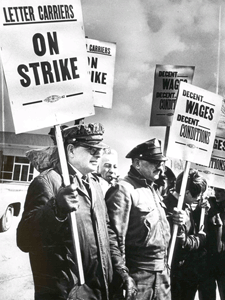HEALTH AND SAFETY ON THE PICKET-LINE
Members of the CUPW Vancouver Local:
As we prepare for the likelihood that we will either be on strike or locked-out by our employer in the very near future, it is quite possible that there are many among us who have never walked a picket-line before, who may be feeling somewhat apprehensive or nervous, and uncertain of what to expect.
 Already, many people may be experiencing stress at the thought of a loss of income during a labour dispute. We encourage you to prepare for this now as much as possible. March is a 3 paycheque month, which might allow some people to put money aside. Consider applying for a line of credit, if you have not already done so, as the interest rates are generally lower than that of credit cards. Please remember as well that as long as you are present for your assigned picket duty shifts, you are entitled to $175.00 per week in strike pay.
Already, many people may be experiencing stress at the thought of a loss of income during a labour dispute. We encourage you to prepare for this now as much as possible. March is a 3 paycheque month, which might allow some people to put money aside. Consider applying for a line of credit, if you have not already done so, as the interest rates are generally lower than that of credit cards. Please remember as well that as long as you are present for your assigned picket duty shifts, you are entitled to $175.00 per week in strike pay.
Canada Post will suspend our extended health care benefits, so plan accordingly for any therapies or treatments that you require for your health and well-being. Most importantly, take care of yourself – eating well, getting enough rest and exercise and ensuring that you are prepared and have supports in place will better enable you to deal with the stresses you are likely to encounter during a strike or lock-out.
It is not unusual for emotions to run high on a picket line, and incidents of violence can and do occur. A strike can affect so many aspects of a person’s life, including their health, relationships, and income level, which can contribute to a great deal of stress. In addition, when people feel that their jobs are at stake and their livelihood is threatened, anxiety can increase. The use of replacement workers, or scabs, can create an extremely hostile environment on a picket-line, which is why labour organizations have repeatedly demanded anti-scab legislation in an effort to decrease the risk of picket-line violence.
Vehicles that are determined to cross a picket-line can be a very dangerous hazard for picketers, and have been the cause of critical injuries and even deaths among picketing workers. Assaults are also not uncommon on a picket-line. Although there may be a police presence on a picket-line, there are some labour activists who believe that in many cases the police will respond more quickly to complaints about strikers rather than reckless drivers who put picketing workers and supporters at risk when they attempt to drive across a picket-line. We urge you to use caution and always consider your own safety and well-being and that of your colleagues on the picket-line. Any incidents of violence or aggression toward striking workers should be documented, with photographs and audio/video-recording if possible.
CUPW members should be aware of their rights with regard to picketing. Under the law, the right to picket applies to “peaceful informational picketing”. The right to picket does not protect threats, acts of violence, destruction of property, assaults, etc. Picketers can criticize the employer, but not make “defamatory” statements. Picketers must avoid sexist, homophobic and racist or any derogatory comments applied to equity-seeking groups.
This is a time to seek out as much help and support as is available to you. Friends and family can be crucial in helping us through difficult times, as can the people standing beside us on the picket-line. Some with experience will say that, while a strike can be extremely challenging on many different levels, it can also be a very unifying experience that bonds people in a way that nothing else can. Consider ways that you might confront the adversity of a strike by contributing to a positive environment and a spirit of camaraderie on the picket-line – be creative and resourceful, find the humour, and try as much as possible to have fun.
In Solidarity,
Wendy Lund
Health and Safety Director
CUPW Vancouver
[email protected]
db/CUPE-3338

